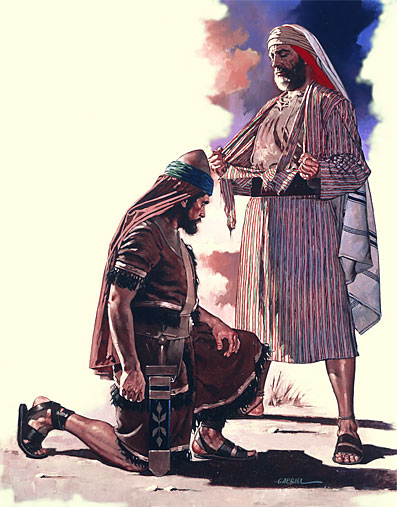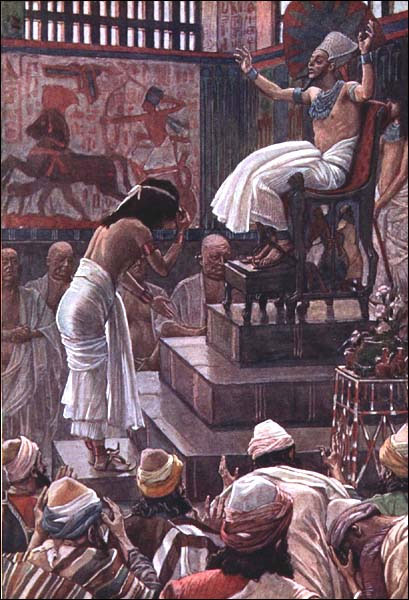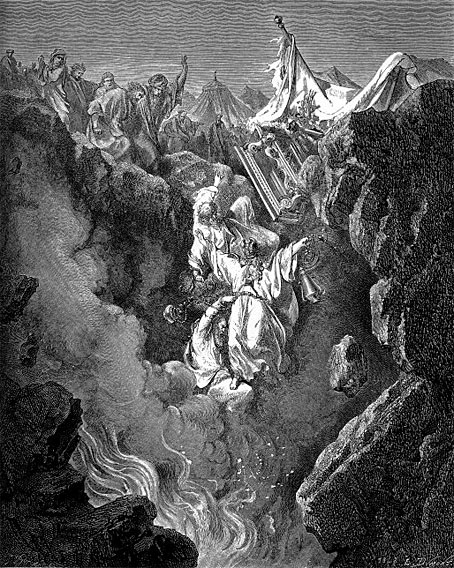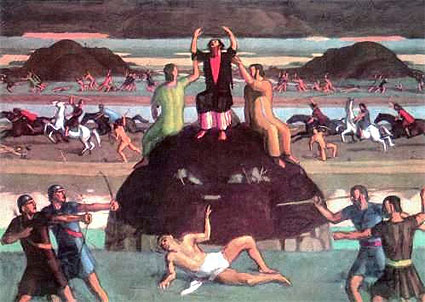Jul
25
2009

or Worship-styles of the Bitter and Twisted
Under Rehoboam, Solomon’s kingdom became even more like Egypt. Solomon had imposed greater taxes upon his people than were appropriate, and his son Rehoboam took this to the extreme. So the Lord brought about a new Exodus, with Jeroboam as a kind of Moses. David felt guilty for cutting the corner off Saul’s robe — ie. grasping at Saul’s symbol of office — but to Jeroboam the prophet gave ten of the twelve pieces of his robe, the ten northern tribes.
Continue reading
Comments Off | tags: Aaron, David, Egypt, Golden, Jeroboam, Moses, Saul, Solomon | posted in Biblical Theology, Christian Life
Jul
14
2009

or Theonomy in the Bible
“…instead of Moses and Aaron challenging the powers that be, we have Herodian preachers crying “Peace, peace” when there is no peace. Nathan is not qualified to confront David because Nathan himself has been sleeping around.”
In his post Christianity as Comprehensive Cultural Tribunal?, timsmartt questions the validity of philosophy’s self-appointed role as an unbiased cultural referee and wonders whether Christianity should take that role:
Continue reading
Comments Off | tags: Aaron, Abraham, Against Hyperpreterism, antichrist, Daniel, Esther, Herod, Jethro, John the Baptist, Korah, Melchizedek, Mordecai, Moses, Nathan, Philosophy, Postmillennialism, Solomon | posted in Biblical Theology, The Last Days, The Restoration Era
Jun
25
2009
 “Let no one deceive you by any means; for that Day will not come unless the falling away comes first, and the man of sin is revealed, the son of perdition.” (2 Thessalonians 2:3)
“Let no one deceive you by any means; for that Day will not come unless the falling away comes first, and the man of sin is revealed, the son of perdition.” (2 Thessalonians 2:3)
Non-dispensationalists are often accused of “Replacement Theology,” that is, the church replaced Israel. But we find in the Old Testament many examples of the same process prefiguring what the people of God went through in the first century. It is not replacement, but transformation.
Continue reading
Comments Off | tags: Aaron, AD70, Caleb, Ezra, James Jordan, Judaisers, Korah, Moses | posted in Biblical Theology, Quotes, The Last Days
Jun
7
2009
A couple of brave readers of my book Totus Christus have pointed out an apparent discrepancy in my ordering of the above three roles. One kindly writes:
The only question of substance I have for you concerns the prophet, priest and king flow of OT history. It may be that you disagree with Jim, but he’s quite insistent that the proper order is priest, king, prophet. He discusses this in From Bread to Wine, p. 9-15. In any case, it might be helpful to explain why you deviate…
Continue reading
Comments Off | tags: Aaron, David, Dominion Theology, High Priest, James Jordan, Moses, Music, Solomon | posted in Biblical Theology, Totus Christus
Apr
15
2009
Witness or Worship?
“…the political task of Christians is to be the church rather than to transform the world”–Stanley Hauerwas, Resident Aliens.
This presents a false dichotomy. When Gideon and David were faithful, God went ahead of them and defeated their enemies. Would it be fair to assume that Hauerwas is just saying that political activism is getting the cart before the horse? If so, then I agree with him. When the church is faithful, the blessings of God transform the world around her.
Continue reading
Comments Off | tags: Aaron, Ark of the Covenant, David, Ezekiel, Gideon, Holy Place, James Jordan, Manna, Politics, Table of Showbread | posted in Biblical Theology, Ethics
Apr
10
2009
Attack from the Abyss

As with most things in the Bible the pattern begins in Genesis.
Unlike the serpent’s warriors, who live by the sword, God’s warrior is a father-ruler who fights only to protect those in his care. Nimrod was a serpent-king—a dragon; Abram was a servant-king, God’s answer to Nimrod the ‘rebel’ (most likely Gilgamesh).
Satan’s attack on ‘the offspring of the woman’ through Pharaoh had failed, so he resorted to inciting a conspiracy of nations. The serpent became a dragon. But Abram (as a good Gilgamesh/Nimrod), along with the men of his household, defeated them, rescued Lot and his family, and very importantly, plundered the attackers. The darkest nights that God allows are always opportunities for more glory. And, this being HOLY war, Abram refused the ‘devoted’ plunder.
The next instance involves Amalek, who attacked Israel in the wilderness, and mercilessly picked off the stragglers. Once again, God’s man “came down” to fight – in Joshua, at Moses’ command – with Moses, Hur and Aaron as Ark and cherubim on the holy hill, the “garden gate”.
“The Lord will have war with Amalek from generation to generation.” (Exodus 17:16)
This statement about Amalek is more loaded than it seems. Amalek was defeated, and the plunders from the victory were devoted to building God’s house in the wilderness. We will see this pattern again and again. Each time, deliverance for God’s people is on a greater scale, and the defeat more catastrophic for His enemies.
Comments Off | tags: Aaron, Abraham, Amalek, Genesis, Holy war, Moses, Nimrod, Pharaoh, Tabernacle | posted in Against Hyperpreterism, Biblical Theology, The Last Days, Totus Christus
Apr
10
2009
“And I cut off the three shepherds in one month…” Zechariah 11:8
Who are these mysterious three shepherds?
Theories abound, most prominently that the Lord refers to the offices of prophet, priest and king in first century Judah. Perhaps, as with Zechariah 14, the pattern of Israel’s feasts (as outlined in Leviticus 23) structures Zechariah 11. If you look carefully you will also see the Creation week.
Continue reading
Comments Off | tags: Aaron, Feasts, Moses, Priesthood, Zechariah | posted in The Last Days, The Restoration Era





























